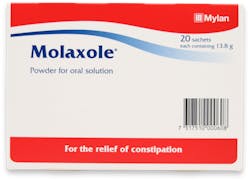Viatris Lactulose 3.1-3.7 g/5ml oral solution 300ml
Viatris Lactulose 3.1-3.7 g/5ml oral solution 300ml
What 500,000+ customers say about medino:
Get notified when back in stock
Description
Lactulose oral solution is a laxative medicine that makes the stool softer and easier to pass by drawing water into the bowel. It belongs to a group of medicines known as laxatives, and the active substance is lactulose.
Key features:
- Lactulose oral solution is a laxative medication.
- The active substance in Lactulose makes the stool softer and easier to pass.
- Lactulose is not absorbed into the body.
- Lactulose oral solution is used to treat constipation.
What does it mean to be constipated?
Being constipated means that your bowel movements are infrequent and difficult to pass, often resulting in hard and dry stool. Although it is a common issue, going more than 3 days without a bowel movement is considered too long and can cause discomfort. While not usually serious, resolving constipation can greatly improve overall well-being.
What are the common symptoms of constipation?
Common symptoms of constipation include having few bowel movements, experiencing difficulty while having a bowel movement, passing hard or small stools, feeling like everything did not come out, and having belly bloating. Some people may also feel the need to press on their belly or use a finger to remove stool from their bottom in order to empty their bowels.
How does lactulose work?
Lactulose is classified as an osmotic laxative that is commonly used to treat constipation. Once consumed, it is metabolized in the bowel and breaks down into substances that attract water out from the body and into the bowel. This process helps to soften stool and make it easier to pass, effectively relieving constipation.
What does Lactulose Solution contain?
The active ingredient in Lactulose Solution is lactulose. Each 5ml of Lactulose Solution contains 3.35g of lactulose. Lactulose Solution does not contain any other ingredients, but it may contain small amounts of other sugars, such as lactose, galactose, epilactose, and fructose.
What are the precautions and warnings associated with taking Lactulose oral solution?
Before taking Lactulose oral solution, you should talk to your doctor if you suffer from any medical conditions or illnesses, in particular, if you suffer from unexplained tummy aches, heart problems caused by accumulation of gas in the bowel or stomach (called Roemheld syndrome), if you are unable to digest milk sugar (lactose), or if you have diabetes. You should not take Lactulose oral solution if you suffer from galactose or fructose intolerance, Lapp lactase deficiency, or glucose-galactose malabsorption. If you experience symptoms like wind or bloating after using Lactulose oral solution, stop treatment and consult your doctor. Long-term use of unadjusted dosages or misuse can lead to diarrhoea and disturbance of the mineral balance. Elderly patients, or those in bad general condition taking Lactulose oral solution longer than 6 months, require regular blood checks of their mineral levels.
What should I do if I forget to take Lactulose oral solution?
If you forget to take a dose, then take the next dose at the usual time. Do not take a double dose to make up for a forgotten dose.
What should I do if I take too much Lactulose oral solution?
If you take more Lactulose oral solution than you should, please contact your doctor or pharmacist. When you have taken too much Lactulose oral solution, diarrhoea and abdominal pain may occur.
Can Lactulose oral solution cause side effects?
Yes, like all medicines, Lactulose oral solution can cause side effects, although not everybody gets them. The most common side effects are diarrhoea, flatulence (wind), nausea (feeling sick), vomiting, and abdominal pain. When dosages higher than instructed are used, abdominal pain and diarrhoea may occur. Flatulence may occur during the first few days of treatment, and as a rule, it disappears after a few days. If you get any side effects, talk to your doctor or pharmacist. This includes any side effects not listed in this leaflet.
Can Lactulose oral solution be taken during pregnancy and breastfeeding?
If you are pregnant or breastfeeding, think you may be pregnant or are planning to have a baby, ask your doctor or pharmacist for advice before taking this medicine. Lactulose oral solution may be used during pregnancy and breastfeeding.
Ingredients
5 ml contains 3.3 g lactulose.
Usage and Instructions
Starting dose should give you 2-3 soft stools daily. Adjust if you still aren't getting relief. Lactulose can take up to 48hours to have an adequate treatment effect.
Starting dose:
Adults and children over 14yrs:
15-45 ml
Children 7-14yrs:
15ml
Children 1-6yrs:
5-10ml
Babies:
Up to 5ml
The starting dose can be adjusted after adequate treatment effect is achieved.
Maintenance dose:
Adults and children over 14yrs:
15-30ml
Children 7-14yrs:
10-15ml
The lactulose solution may be administered diluted or undiluted. The amount you take should be adjusted to how well this medicine works for you. Lactulose may be given as a single daily dose or in two divided doses, using the measuring cup.
A single dose of Lactulose should be swallowed in one and should not be kept in your mouth for an extended period of time.
Warnings
If this medicine is not working after a few days, you should consult your doctor or our pharmacist.
Lactulose may contain traces of sugars (not more than 67 mg/ml lactose, 100 mg/ml galactose, 67 mg/ml epilactose, 27 mg/ml tagatose and 7 mg/ml fructose). If you're intolerant to lactose, take with care.
The dose normally used to relieve constipation shouldn't be a problem for diabetics. However, higher doses used for treatment of more intensive constipation or illness may need to be taken into consideration for diabetics.
Anyone with rare hereditary problems of galactose or fructose intolerance, lactase deficiency or glucose-galactose malabsorption shouldn't take this medicine.
For patients with gastro-cardiac syndrome (Roemheld syndrome), lactulose should only be taken after consultation with your doctor or our pharmacist. If symptoms like bloating occur in such patients after lactulose intake, the dose should be reduced or the treatment should be discontinued.
Chronic use of unadjusted doses and misuse can lead to diarrhoea and disturbance of your electrolyte balance.
Those aged 65+ or anyone who is in bad health while taking lactulose for more than 6 months may need to take electrolytes.
It's recommended to drink around 6-8 glasses of water a day while taking laxatives.
Do not store above 25°C.
Keep the container tightly closed.
Side Effects
Flatulence may happen during the first few days of treatment, but it usually disappears after a couple of days.
If the dose is too high, abdominal pain and diarrhoea may also happen – just reduce the dose to help these go away.






